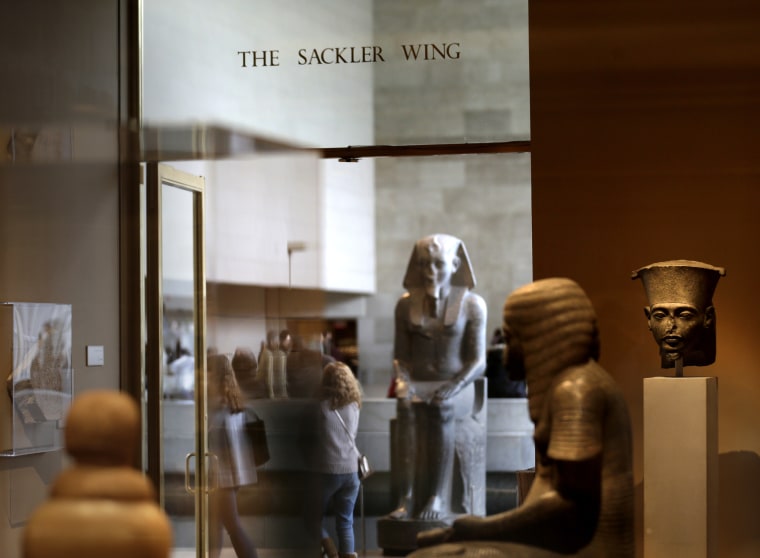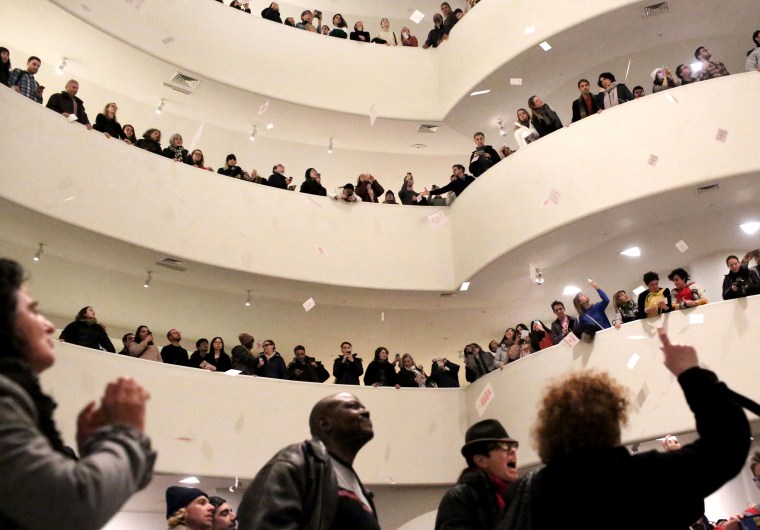Over the decades, the Sackler family — the principal owners of Purdue Pharma — earned a reputation as transatlantic patrons of the arts. They made generous financial contributions to some of the leading cultural institutions in the United States and abroad — including the Guggenheim, the Smithsonian and the Louvre — as well as top universities and medical centers.
"The Sacklers were one of the most publicly generous philanthropic families out there," said Benjamin Soskis, a research associate at the Center on Nonprofits and Philanthropy at the Urban Institute in Washington, D.C. "They were very engaged. They sat on boards. They attended many public events."
But the legal drama around Purdue Pharma's production of OxyContin, the powerful painkiller blamed for fueling the opioid epidemic that has killed tens of thousands of Americans, now threatens to halt some of the family's prolific philanthropic activities and overshadow its legacy as an arts benefactor.
In recent weeks, some of the artistic institutions that had long enjoyed the Sacklers' largesse signaled an apparent change of course.
New York's Guggenheim and London's Tate museums both said they would no longer accept gifts from the family, as reported by The New York Times.
London's National Portrait Gallery said it and the Britain-based Sackler Trust, a charity connected to the family, jointly decided to call off a planned $1.3 million donation.
“The allegations against family members are vigorously denied, but to avoid being a distraction for the National Portrait Gallery, we have decided not to proceed at this time with the donation,” the Sackler Trust said in a statement March 19.
The trust said Monday it would put all future donations on hold for the time being.
The museum announcements come amid the mounting legal scrutiny of Purdue Pharma, the privately-held company controlled by members of the Sackler family. In the latest development, Purdue settled with the Oklahoma attorney general for $270 million roughly two months before the scheduled start date of a televised trial in the opioid-ravaged state, where charges that the pharmaceutical company had deceptively marketed OxyContin would have been on display.
The company faces some 1,600 other lawsuits blaming it for promoting OxyContin while downplaying the drug's addictive properties, and Massachusetts last year named eight members of the Sackler family in a complaint that accused the company of spinning a “web of illegal deceit” to boost profits.
Purdue, which has denied the allegations, has generated sales of more than $35 billion since debuting OxyContin in 1995, according to Forbes.
The Sacklers named in the Massachusetts complaint included Beverly and Theresa, the widows of brothers Raymond and Mortimer Sackler, who turned the Stamford, Connecticut-based company into a pharmaceutical giant. Also named were three of Mortimer’s seven children.
The Sackler family, which according to Forbes is worth some $13 billion, has noted that Arthur Sackler, the third brother who founded the company and whose name adorns the Smithsonian's Sackler Gallery, died before Purdue began selling OxyContin.

Soskis, the philanthropy scholar, said museums in the United States and Britain might have felt greater pressure to distance themselves from the Sacklers after high-profile journalistic exposés in The New Yorker and Esquire drew increased public attention to Purdue and OxyContin.
The growing backlash against Purdue might have also been driven by grassroots activism, Soskis added. Nan Goldin, an American photographer who overcame an OxyContin addiction and whose work documents the opioid crisis, has led protests at the Guggenheim, New York's Metropolitan Museum, and Harvard University, where activists held banners that said "SHAME ON SACKLER."
In one protest last month, activists appeared at the Guggenheim and dropped thousands of strips of white paper symbolizing prescription slips — a reference to a legal document that quoted Richard Sackler, son of Raymond Sackler, saying the "launch of OxyContin tablets will be followed by a blizzard of prescriptions that will bury the competition."
"The journalism and the activism converged and made it possible, I think, for the most prominent cultural institutions to reconsider their policies," Soskis said.
Soskis said he expected that other bastions of arts and learning that had accepted Sackler family funds would also "really have to take a careful look" at their policies and standards. He said he also foresaw the possibility of increased activism targeting cultural centers that have not yet backed away from the family.


